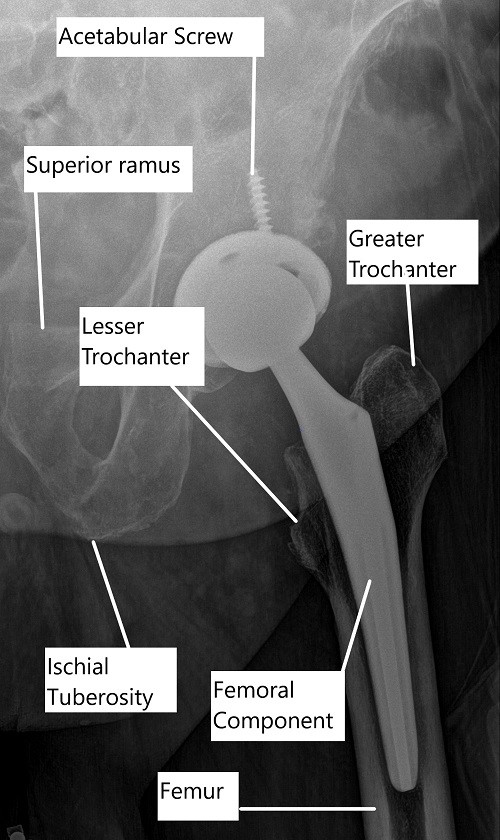Outpatient Hip Replacement
Hip replacement surgery that allows the patients to go home the same day of the surgery is known as outpatient hip replacement surgery. With the advances in hip replacement, the risks associated with hip replacement surgery have decreased significantly. Medically healthy patients who may need a hip replacement surgery may benefit from a same-day discharge to home.

X-ray showing a total hip replacement.
While outpatient hip replacement surgery offers several advantages, not all patients may be candidates for outpatient hip replacement. Candidates for outpatient hip replacement surgery are:
- Ideally, non-smoker as smoking is associated with increased risk of wound non-healing and increased postoperative pain.
- Free from major medical illnesses such as diabetes, cardiovascular diseases such as coronary artery disease, or lung diseases such as COPD.
- Generally, outpatient hip replacement is only advised in patients who are physiologically 70 years or less.
- The candidates for outpatient hip replacement surgery may need a social and family support system at home.
- Patients with a history of illicit drugs are poor candidates for outpatient surgery as their postoperative pain management may be complicated due to prior drug abuse.
- Candidates for outpatient hip replacement usually are not obese or overweight.
Outpatient Hip Replacement Procedure
The patient’s entire health care team regarding the patient’s suitability for the outpatient surgery. The patient’s primary care physician, anesthesiologist, and pain management physicians work along with the surgeon to determine the best course for the patient’s surgery.
The patient is advised to make accomodations at home for his/her return the same day of the surgery. The accommodations may include stocking food supplies, toiletries, and if possible to have living quarters in the same floor of the kitchen and the toilet.
The surgery may be done at an outpatient surgical center or a hospital. The surgery usually involves an approach through the side of the hip. After a general anesthesia the surgeon gives a 8-10 inches of incision and separates/cuts the tissues and muscles to reach the hip joint. The surgeon then proceeds to remove the diseased head of the femur and shaves the diseased inner part of the acetabulum.
The surgeon then places a prosthetic metal alloy cup in the socket and usually secures it with one or more metal screws. The canal of the femur is serially reamed to prepare it for the metallic femoral component. After trial of implants and selecting the right size of implant, the surgeon press fits the implant in the canal.
A polyethylene spacer is placed in between the head and the socket for smooth gliding of the prosthetic joint. The incision is then closed in layers and a sterile dressing is placed on the surgical wound. The patient is then taken out of the anaesthesia and administered appropriate pain relief medications.
The patient is continuosly monitored in the postoperative room. The patient is given detailed instructions regarding the hip replacement precautions which may include:
- Use of abduction pillow when lying down and sleeping.
- Not cross the legs while sitting, lying or standing.
- Not twist on the operated leg.
- Not to turn the leg/foot on the operated side inward.
- Surgical wound/dressing care.
The patient is also advised in detail regarding any possible complications and how to reach for help. The possible complications, although rare, may include blood clots in the legs, breathing problems, heart problems, infection, bleeding, fracture, etc.
The patients are also advised in detail regarding expected postoperative pain and it’s management. The use of compression stockings and measures to reduce swelling. Thorough instructions are given regarding walking after replacement and the use of walking aid to prevent accidental slip and fall.
A nurse and a therapist usually visit the patient at home to assess their recovery, change dressing if necessary and guide the patient regarding exercise. Should any complication arise, the patient may be admitted to the hospital.

Instruments used in a total hip replacement.
Advantages
The outpatient hip replacement offers rehabilitation in the comfort of the patient’s own home. The patients often find their home environment more reassuring and convenient than a hospital. The outpatient surgery has been linked with better participation in physical therapy. The outpatient hip replacement also decreases the chances of hospital acquired infections. An outpatient surgery is potentially associated with a decrease in health care burden and costs.
Disadvantages
The patients may feel more secure staying at a hospital where medical help may be more readily available if needed. Pain management may be better in an in-hospital setting. Even when a patient is considered a safe candidate for outpatient surgery, complications may arise and lead to admission in a hospital.
Conclusion
Hip replacement surgery techniques and implants have advanced in the past decades that the complications associated with the surgery are rare. The complications are more predictable and the pain management has evolved to be tailored according to each patient’s needs.
A greater number of patients are being offered outpatient hip replacement surgery today. Even if patients are not candidates for outpatient surgery, patients usually tend to stay only a night or two depending upon their medical conditions. Speak with your orthopedic surgeon if outpatient surgery may be suited in your case.
Do you have more questions?
What are the criteria for being considered a candidate for outpatient hip replacement surgery?
Candidates for outpatient hip replacement surgery typically include patients who are in good overall health, have a strong support system at home, and are motivated to actively participate in their recovery.
How is outpatient hip replacement surgery different from traditional inpatient surgery?
Outpatient hip replacement surgery involves a shorter hospital stay or no hospitalization at all, with patients being discharged on the same day as the surgery. Traditional inpatient surgery requires an overnight stay or longer hospitalization.
What are the potential benefits of outpatient hip replacement surgery?
Potential benefits include reduced hospitalization costs, faster recovery, decreased risk of hospital-acquired infections, and the ability to return to the comfort of home sooner after surgery.
How is pain managed during and after outpatient hip replacement surgery?
Pain management techniques may include a combination of regional anesthesia, nerve blocks, oral medications, and non-pharmacological interventions to ensure patient comfort during and after surgery.
Are there any specific pre-operative preparations required for outpatient hip replacement surgery?
Pre-operative preparations may include medical evaluations, imaging tests, cessation of certain medications, and lifestyle modifications to optimize surgical outcomes and minimize risks.
What is the typical timeline for recovery and rehabilitation after outpatient hip replacement surgery?
Recovery and rehabilitation timelines can vary depending on individual factors, but many patients are able to resume normal activities within a few weeks to months after surgery, with the guidance of a physical therapist.
How is infection risk minimized during outpatient hip replacement surgery?
Strict adherence to sterile techniques, antibiotic prophylaxis, and other infection prevention protocols are utilized to minimize the risk of surgical site infections during outpatient hip replacement surgery.
Can patients with underlying medical conditions undergo outpatient hip replacement surgery?
Patients with certain well-controlled medical conditions may still be candidates for outpatient hip replacement surgery, but individual assessment and consultation with a healthcare provider are necessary to determine suitability.
What type of anesthesia is typically used for outpatient hip replacement surgery?
Patients may receive either general anesthesia or regional anesthesia, depending on their medical history and the preference of the surgical team.
Are there any age restrictions for patients undergoing outpatient hip replacement surgery?
Age alone is not a determining factor for candidacy, as suitability for surgery depends on overall health and individual circumstances.
How soon after surgery can patients expect to be discharged home following outpatient hip replacement surgery?
Patients are typically discharged home on the same day as surgery, once they have met specific criteria for readiness, such as stable vital signs, pain control, and ability to safely mobilize.
What follow-up care is necessary after outpatient hip replacement surgery?
Follow-up care typically involves regular post-operative appointments with the surgeon to monitor healing, address any concerns, and track progress. Physical therapy may also be recommended to aid in recovery.
Are there any dietary restrictions or nutritional guidelines that patients should follow before or after outpatient hip replacement surgery?
While there are no specific dietary restrictions, maintaining a balanced diet rich in nutrients can support the healing process and overall recovery.
How soon can patients expect to experience pain relief and improved mobility after outpatient hip replacement surgery?
Many patients experience significant pain relief and improved mobility shortly after surgery, with continued improvement over the following weeks and months as they engage in rehabilitation exercises.
Can outpatient hip replacement surgery be performed using minimally invasive techniques?
Yes, outpatient hip replacement surgery can often be performed using minimally invasive techniques, which involve smaller incisions and less disruption to surrounding tissues, potentially leading to faster recovery and less post-operative pain.
What factors determine whether a patient is a suitable candidate for outpatient hip replacement surgery?
Factors such as overall health, medical history, age, and the presence of a strong support system at home are considered when determining candidacy for outpatient hip replacement surgery
How is the accuracy of implant placement ensured during outpatient hip replacement surgery?
Advanced imaging techniques and robotic-assisted technology may be used to ensure precise implant placement and optimal alignment of the hip joint during outpatient hip replacement surgery.
What are the potential risks and complications associated with outpatient hip replacement surgery?
While complications are rare, they can include infection, blood clots, implant loosening, nerve injury, or fracture. Your surgeon will discuss these risks and how they are minimized during the procedure.
Can outpatient hip replacement surgery be performed on both hips simultaneously?
Simultaneous bilateral hip replacement surgery may be considered for select patients, but individual assessment and consultation with a healthcare provider are necessary to determine suitability and minimize risks.
How is blood loss managed during outpatient hip replacement surgery?
Blood loss during surgery is minimized through meticulous surgical techniques, the use of minimally invasive approaches, and the administration of medications to promote clotting.
Are there any restrictions on driving or returning to work after outpatient hip replacement surgery?
Patients may be advised to refrain from driving for a certain period of time and to gradually return to work or other activities as guided by their surgeon and physical therapist.
Can patients with a history of previous hip surgeries undergo outpatient hip replacement surgery?
Patients with a history of previous hip surgeries may still be candidates for outpatient hip replacement surgery, but individual assessment and consultation with a healthcare provider are necessary to determine suitability.
How is post-operative pain managed for patients undergoing outpatient hip replacement surgery?
Pain management techniques may include a combination of oral medications, regional anesthesia, nerve blocks, or other modalities to ensure patient comfort during recovery.
What type of rehabilitation exercises are recommended after outpatient hip replacement surgery?
My name is Dr. Suhirad Khokhar, and am an orthopaedic surgeon. I completed my MBBS (Bachelor of Medicine & Bachelor of Surgery) at Govt. Medical College, Patiala, India.
I specialize in musculoskeletal disorders and their management, and have personally approved of and written this content.
My profile page has all of my educational information, work experience, and all the pages on this site that I've contributed to.

